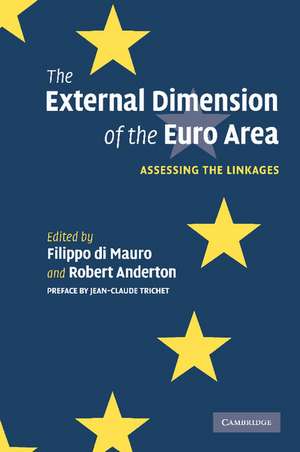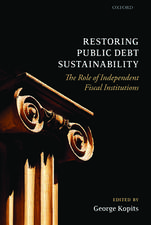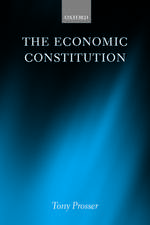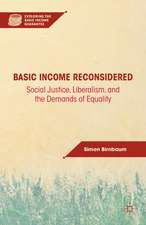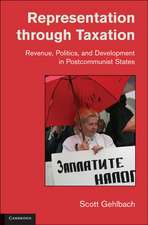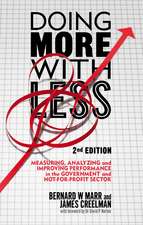The External Dimension of the Euro Area: Assessing the Linkages
Editat de Filippo Di Mauro, Robert Andertonen Limba Engleză Paperback – 3 oct 2012
| Toate formatele și edițiile | Preț | Express |
|---|---|---|
| Paperback (1) | 281.67 lei 6-8 săpt. | |
| Cambridge University Press – 3 oct 2012 | 281.67 lei 6-8 săpt. | |
| Hardback (1) | 724.58 lei 6-8 săpt. | |
| Cambridge University Press – 25 apr 2007 | 724.58 lei 6-8 săpt. |
Preț: 281.67 lei
Nou
Puncte Express: 423
Preț estimativ în valută:
53.90€ • 58.53$ • 45.28£
53.90€ • 58.53$ • 45.28£
Carte tipărită la comandă
Livrare economică 23 aprilie-07 mai
Preluare comenzi: 021 569.72.76
Specificații
ISBN-13: 9781107410596
ISBN-10: 1107410592
Pagini: 226
Dimensiuni: 152 x 229 x 12 mm
Greutate: 0.31 kg
Editura: Cambridge University Press
Colecția Cambridge University Press
Locul publicării:New York, United States
ISBN-10: 1107410592
Pagini: 226
Dimensiuni: 152 x 229 x 12 mm
Greutate: 0.31 kg
Editura: Cambridge University Press
Colecția Cambridge University Press
Locul publicării:New York, United States
Cuprins
Preface Filippo di Mauro and Robert Anderton; 1. Introduction Filippo di Mauro and Robert Anderton; 2. The external dimension of the Euro area: stylised facts and initial findings Filippo di Mauro and Robert Anderton; 3. Product variety and macro trade models: implications for EU Accession Countries Joseph Gagnon; 4. Exchange-rate pass-through to import prices in the Euro area José Manuel Campa, Linda S. Goldberg and José M. Gonzaléz-Mínguez; 5. The international equity holdings of Euro area investors Philip R. Lane and Gian Maria Milesi-Ferretti; 6. Global linkages through foreign direct investment W. Jos Jansen and Ad C. J. Stokman; 7. Shocks and shock absorbers: the international propagation of equity market shocks and the design of appropriate policy responses Ray Barrel and E. Philip Davis; 8. The Euro area in the global economy: its sensitivity to the international environment and its influence on global developments Alessandro Calza and Stephane Dees; Index.
Recenzii
Review of the hardback: 'Policymakers and researchers who care about the nature of external influences on the Euro Area will find this book invaluable both for the topics covered as well as for the range of state-of-the-art methodologies applied. It should be read not only by policymakers and researchers in Europe but also more widely, since the influences and the methodologies that can be used to understand these global linkages are relevant and applicable to all countries.' Warwick J. McKibbin, Professor of International Economics, Australian National University and Professorial Fellow, The Lowy Institute for International Policy and Senior Fellow, The Brookings Institution
Review of the hardback: 'Recent years have seen important changes in the international transmission mechanism that affects monetary policy around the world. The contributors to this book are responsible for valuable insights into those changes, and to have their work assembled in one place provides an important resource for policy makers and students of international economics alike.' Andrew Bailey, Executive Director, Bank of England
Review of the hardback: 'Given the preponderance of intra-European trade among euro area members, it is tempting to think of the zone as akin to a closed economy. That is a mistaken view however: in part because of the significant influence of the euro zone on global trade flows; and in part because of the growing importance of the euro as a key currency. Having a volume devoted exclusively to the external implications of the euro is therefore timely and welcome, particularly when its contributors include leading academic commentators, practitioners and analysts from the policy-making community. The coverage of the volume is comprehensive, embracing a range of aspects of trade and cross-border investment and the chapters are accessible. This will prove to be a very useful source of reference to researchers and analysts alike.' David Greenaway, Professor of Economics, Pro-Vice-Chancellor and Director of the Leverhulme Centre for Research on Globalisation and Economic Policy, University of Nottingham
Review of the hardback: 'Recent years have seen important changes in the international transmission mechanism that affects monetary policy around the world. The contributors to this book are responsible for valuable insights into those changes, and to have their work assembled in one place provides an important resource for policy makers and students of international economics alike.' Andrew Bailey, Executive Director, Bank of England
Review of the hardback: 'Given the preponderance of intra-European trade among euro area members, it is tempting to think of the zone as akin to a closed economy. That is a mistaken view however: in part because of the significant influence of the euro zone on global trade flows; and in part because of the growing importance of the euro as a key currency. Having a volume devoted exclusively to the external implications of the euro is therefore timely and welcome, particularly when its contributors include leading academic commentators, practitioners and analysts from the policy-making community. The coverage of the volume is comprehensive, embracing a range of aspects of trade and cross-border investment and the chapters are accessible. This will prove to be a very useful source of reference to researchers and analysts alike.' David Greenaway, Professor of Economics, Pro-Vice-Chancellor and Director of the Leverhulme Centre for Research on Globalisation and Economic Policy, University of Nottingham
Descriere
This book improves our understanding of how external economic developments affect the Euro area.
